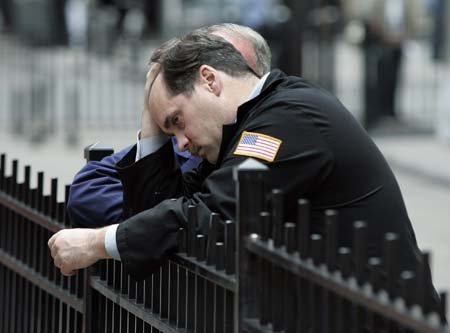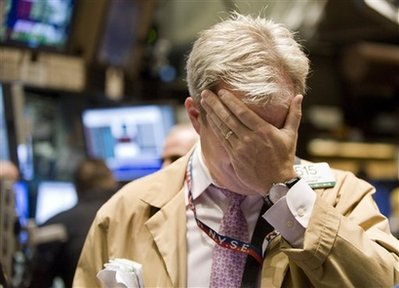US lawmakers' rejection of the $700 billion rescue plan makes the prospects for the US and world financial markets more uncertain and may affect investor confidence in China's stock market, analysts warned.
 Asian stocks tumble after US bailout fails
Asian stocks tumble after US bailout fails
|

|
|
A trader stands outside the New York Stock Exchange September 29, 2008. The Dow Jones industrial average Monday posted its largest point decline ever while the benchmark S&P 500 had its worst day since the 1987 crisis with an 8.8 percent drop. [Agencies]
|
In the worst scenario, the bailout failure would cause a major decline in US and global financial markets and ultimately affect the real economy.
Analysts said it will cut demand for China’s exports, hit its tourism industry and impact on the overall Chinese economy.
China needs to make more efforts to boost domestic demand to buffer the impact of reduced external demand.
After the US rescue plan was rejected, dismayed investors sent the Dow Jones industrials plunging 777 points, its biggest ever single-day decline and more than the loss after the Sept 11, 2001 terror attacks.
 Bush warns of "painful and lasting" damage if bailout plan not passed
Bush warns of "painful and lasting" damage if bailout plan not passed
The mainland stock market escaped from the impact of the US market slump due to its closure for the seven-day National Day holiday, but Asia-Pacific stock markets opened in a sea of red yesterday, reflecting jitters that US woes would spill over globally.
But the bad news may still hit the mainland market when it resumes trading next week. Considering the fact that it rose more than 25 percent after the government issued a slew of favorable policies since late last month, a post-holiday correction is possible, analysts said.
Economist Joseph Stiglitz warned that without any bailout, the US financial market would implode, bringing the world economy into a serious recession.
If that happened, China would not escape unscathed. Apart from losses incurred from its direct holdings of US debts and securities, its real overall economy would also suffer, said Sun Lijian, an economist with Shanghai’s Fudan University.
Exports would slow as demand for Chinese products declined, he said. Tourism and investment in firms catering to overseas demand would also be affected.
The US, however, will ultimately bail out the financial market even if the House does not approve the current rescue plan, analysts said.
|

|
|
Trader David O'Day rubs his eyes as he works on the floor of the New York Stock Exchange, Monday Sept. 29, 2008. The Dow Jones industrial average lost 777 points Monday after the House vote rejecting the Bush administration's $700 billion plan to buy up bad debt and shore up the financial industry. [Agencies]
|
"It must rescue the market from this crisis, no matter how," said Zuo Xiaolei, chief economist of China Galaxy Securities.
With a new rescue plan being discussed among policymakers, "an interest rate cut by the Federal Reserve is now a must to restore market confidence around the globe," said Sherman Chan, an economist with Moody's Economy.com's Sydney office.
 US bailout plan gets "No" vote
US bailout plan gets "No" vote
"Given the growing stress experienced by financial institutions in recent days, interest rate cuts by major central banks in the coming days seem increasingly likely."
As the US crisis spreads to the Europe, governments there have been forced to bail out their financial institutions, with Fortis, the largest Belgian financial-services company, receiving an 11.2 billion euro ($16.4 billion) rescue package from Belgium, the Netherlands and Luxembourg over the weekend after its shares dropped 35 percent last week in Brussels trading.
Ping An Insurance (Group) Co, China's second-largest insurer which has a 4.2 percent stake in Fortis, may set money aside in its third-quarter results to cover losses from the stake, which was more than 10 billion yuan ($1.46 billion) by last week.
Hong Kong chief calms investors, says city resilient against fiscal turmoil
Chief Executive of Hong Kong Special Administrative Region (HKSAR) Donald Tsang on Tuesday tried to pacify nervous investors after Wall Street's historic overnight slump, saying he is confident Hong Kong's solid economy will see it through the global financial turmoil.
 Wall Street roars back after record plunge
Wall Street roars back after record plunge
The benchmark Hang Seng Index of Hong Kong stock market dived more than 1,000 points shortly after opening in the wake of the US Congress' rejection of a financial bailout plan worth 700 billion US dollars.
Tsang said the US Congress' rejection of the bailout plan will inevitably cause instability throughout the world including the Hong Kong stock market but Hong Kong has considerable experience in dealing with financial crises during the past 10 years.
"We overcame the Asian financial crisis and economic problems led by the severe acute respiratory syndrome (SARS) epidemic," Tsang told reporters at the headquarters of the HKSAR government Tuesday morning, adding: "We must also remember the economic fundamentals of Hong Kong are good. The regulatory system and fiscal economic system are sound. "We should have confidence in ourselves when dealing with crises of this kind."
The Securities and Futures Commission of Hong Kong on Tuesday also reminded market participants it will act against abusive short selling, in addition to its decision last Friday to uphold the up-tick rule and to double penalties imposed by Hong Kong Securities Clearing on failed settlement of short-selling transactions.
 EU: US must meet finance crisis responsibility
EU: US must meet finance crisis responsibility
The commission said its daily monitoring of the market indicates short-selling activities remain at levels consistent with those prior to the current turmoil.
Hong Kong's benchmark index recouped steep early losses of more than 1,000 points to move up 135.53 points, or 0.76 percent, to close at 18,016.21 ahead of Wednesday's National Day holiday.
(China Daily, Xinhua News Agency October 1, 2008)